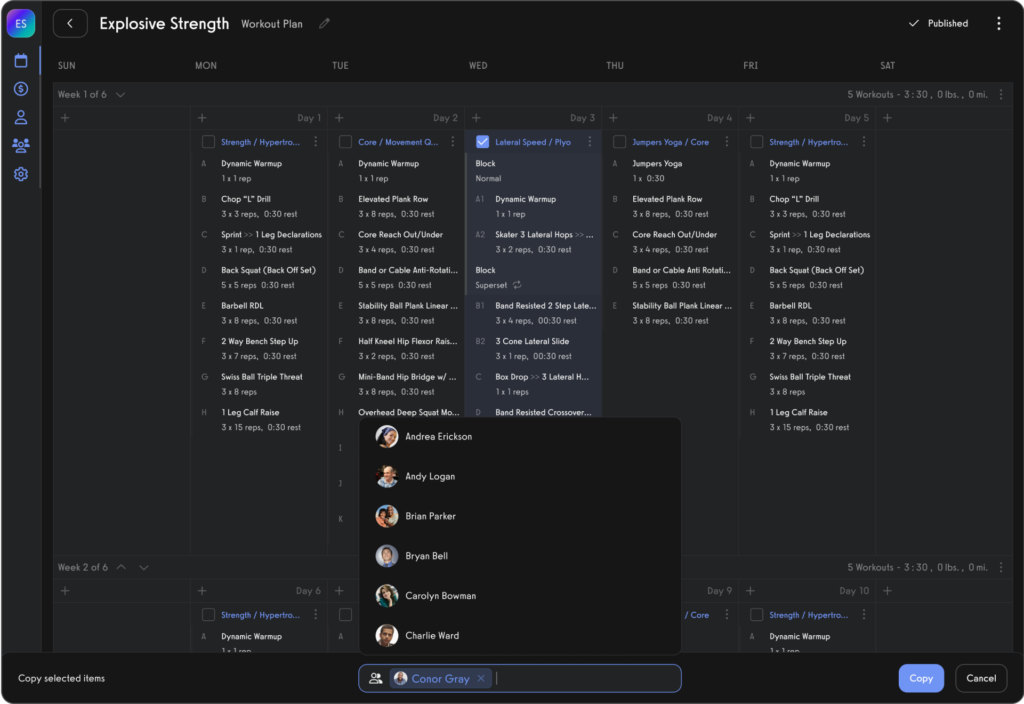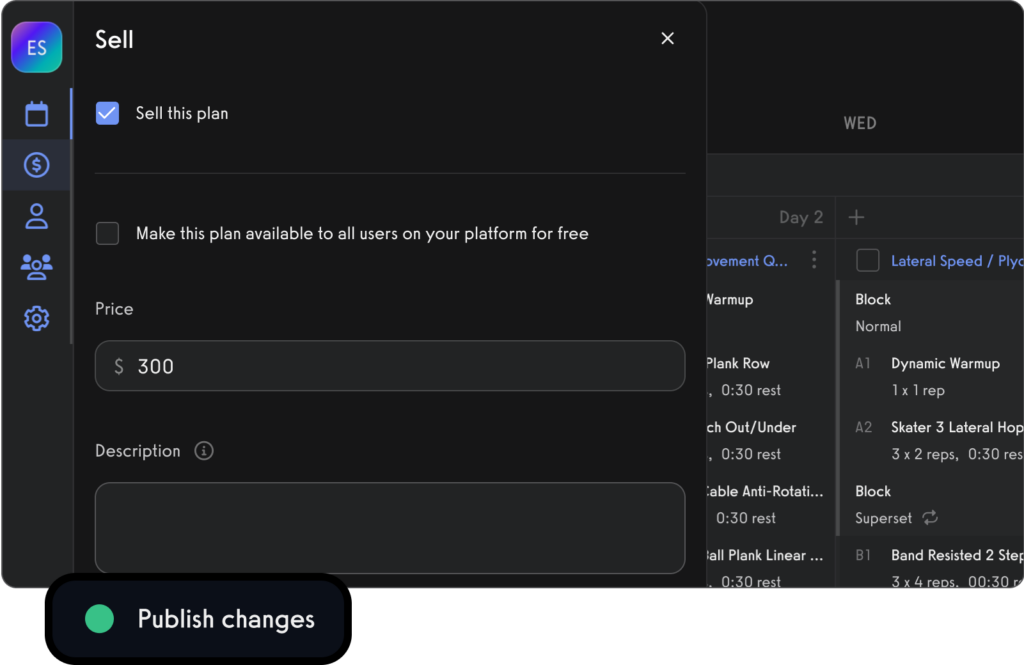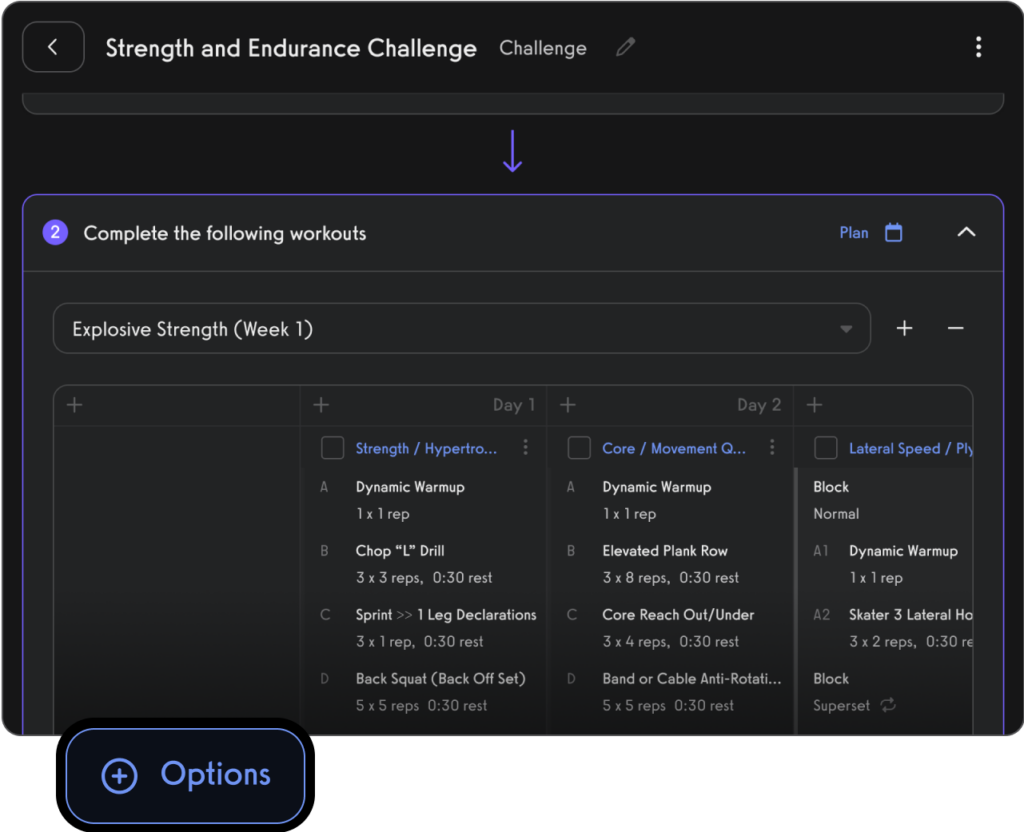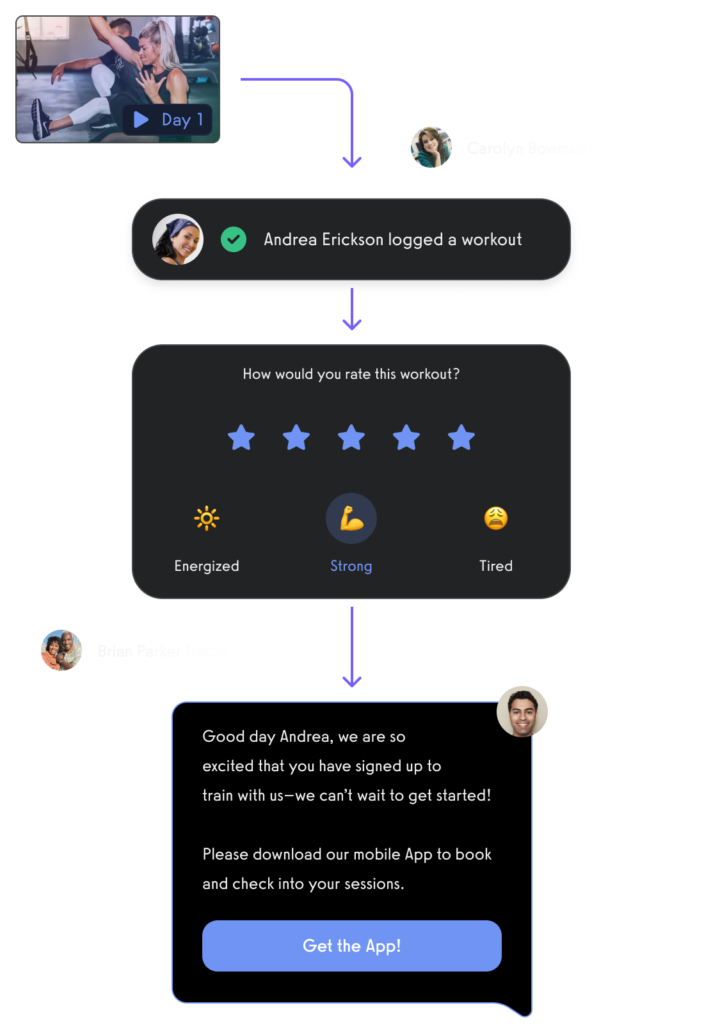NASM Performance Enhancement Specialist (PES) Certification Review (2025)
Read this NASM Performance Enhancement Specialist (PES) Certification Review to decide if the NASM PES Certification is worth it and what the best personal training certification is for you.

This NASM PES review will show you that certifications in the fitness industry are highly valuable for professionals looking to enhance their career opportunities and expand their expertise. One such certification that offers specialized training in performance enhancement is the NASM Performance Enhancement Specialist (PES) certification. In this article, we will explore the PES credential’s purpose, requirements, content, benefits, is NASM PES worth it, and what is PES certification exactly, providing you with a comprehensive review to help you determine if it aligns with your professional goals.
Looking for an in-depth review of the NASM Performance Enhancement Specialist (PES) certification? This article covers everything you need to know about the program, including its benefits, curriculum, and career opportunities.
Whether you want to learn how to become a personal trainer, or learn how to become a fitness influencer, or learn how to open a gym, or learn how to start a fitness business, or anything in between, use the Exercise.com platform to accomplish your fitness business goals.

You can start an online personal training business, make a fitness app, learn how to make money selling workout plans online, put in-person personal training marketing ideas into action, use personal training income ideas to find personal trainer career options that will put you on track for the highest paying fitness jobs, and many other ways to make money from fitness doing what you love.
With the Exercise.com platform you have the best sports performance gym software, the best online fitness coaching software, and the best software for fitness influencers all in one! (Not to mention the best gym software and the best personal training software).
Create workout plans.

Manage clients.


Run online fitness challenges.

Create and sell fitness memberships, products, and digital offers.

Manage, message, and market to your online personal training clients and leads.

All from your very own custom branded fitness apps.


NASM Performance Enhancement Specialist (PES) Certification
The NASM Performance Enhancement Specialist (PES) certification is a program designed to equip fitness professionals with the knowledge and skills necessary to optimize athletic performance, prevent injuries, and enhance overall physical fitness. It focuses on the application of evidence-based training techniques to help clients and athletes reach their full potential.
With the PES certification, fitness professionals gain a deep understanding of the biomechanics, physiology, and psychology behind athletic performance. They learn how to design and implement training programs that target specific performance goals, such as speed, power, agility, and endurance.
One of the key aspects of the PES certification is its emphasis on injury prevention. Fitness professionals learn how to assess movement patterns, identify potential areas of weakness or imbalance, and develop corrective exercises to address these issues. By addressing these underlying problems, they can help athletes avoid common injuries and improve overall performance.
The NASM Performance Enhancement Specialist (PES) certification is renowned for its focus on improving athletic performance and injury prevention, making it a top choice for professionals aiming to work with athletes from amateur to elite levels.
The NASM PES certification is meticulously crafted to provide fitness professionals with advanced knowledge and skills necessary for designing and implementing effective performance enhancement programs tailored to athletes across various sports.
NASM PES General Information
This certification encompasses a broad range of topics, including advanced training techniques, sports nutrition, and injury prevention strategies, to ensure a comprehensive understanding of athletic performance enhancement.
NASM PES Credibility and Reputation
With the backing of the National Academy of Sports Medicine (NASM), the PES certification is globally recognized and esteemed for its rigorous curriculum that expertly blends scientific principles with practical application.
For personal trainers seeking to specialize in the niche of performance enhancement and expand their client base to include athletes, the NASM PES certification provides a prestigious credential that opens up new professional avenues.
NASM PES vs Other Top Performance Enhancement Certifications
Compared to other certifications in the field, the NASM PES stands out for its comprehensive approach and emphasis on cutting-edge, evidence-based training methodologies.
Leveraging the best personal training software, NASM PES certified professionals can efficiently manage their training programs, track athlete progress, and ensure effective communication, thereby enhancing the overall training experience.
This certification is ideal for personal trainers, sports coaches, and fitness professionals who aspire to specialize in performance enhancement, particularly for athletic clientele.
NASM PES Cost
The NASM PES certification offers a competitive pricing structure, with a variety of study materials and resources to accommodate different learning preferences and budgets.
Self-Study
The self-study option allows for maximum flexibility, providing access to extensive digital resources for those who prefer to learn at their own pace.
Premium Self-Study
The premium self-study package includes additional resources like interactive webinars, video content, and more comprehensive study guides for an enriched learning experience.
NASM PES Certification Review – Performance Enhancement Content Coverage
The curriculum is designed to cover all crucial aspects of performance enhancement, ensuring a well-rounded and thorough education for aspiring PES professionals.
Section 1 – Advanced Exercise Science
- An in-depth exploration of exercise physiology, biomechanics, and sports psychology as they relate to performance enhancement.
Section 2 – Assessment and Program Design
- Practical methodologies for conducting athlete assessments and designing customized, sport-specific training programs.
NASM PES Exam Prep and Study Materials
NASM provides an array of study materials, including textbooks, practice exams, and online learning modules, to comprehensively prepare candidates for the PES exam.
NASM PES Certification Requirements
To attain the PES certification, candidates must fulfill specific educational prerequisites and successfully pass the PES exam, demonstrating their mastery of performance enhancement principles.
NASM PES Salary
Obtaining the NASM PES certification can significantly boost a fitness professional’s marketability and potential income, especially when working with athletic populations.
Taking the Final NASM PES Exam
The final exam challenges candidates to apply their knowledge in practical scenarios, ensuring they are fully equipped to enhance athlete performance effectively.
NASM PES Continuing Education and Recertification
Maintaining the NASM PES certification necessitates ongoing education to stay abreast of the latest research and techniques in performance enhancement.
Other NASM Offerings
In addition to the PES certification, NASM offers a wide array of fitness certifications, enabling professionals to further specialize and broaden their expertise within the fitness industry.
NASM PES Overall Rating
Pros
- In-depth focus on advanced performance enhancement techniques
- Global recognition and respect within the fitness and sports communities
- A variety of study options and resources to suit different learning styles
Cons
- The extensive scope of the material may require a significant time commitment to master
- The cost of certification and study materials may be prohibitive for some
The NASM PES certification is a comprehensive credential for those committed to specializing in athletic performance enhancement. By incorporating Exercise.com’s best gym software, PES professionals can further optimize their service offerings, providing tailored, efficient, and impactful training programs that elevate athlete performance to the highest levels.
Understanding the purpose and benefits of the PES certification
The PES certification goes beyond general fitness training and delves into the principles and practices of performance enhancement. By obtaining this certification, fitness professionals can enhance their career prospects and demonstrate their commitment to providing specialized training.
With the PES certification, fitness professionals gain a competitive edge in the industry. They become experts in their field, capable of working with athletes at all levels, from recreational to professional. This specialized knowledge and skill set allow them to command higher salaries and attract a broader range of clients.
Furthermore, the PES certification opens up opportunities for fitness professionals to work with sports teams, athletic organizations, and performance training facilities. They can become trusted advisors to coaches and trainers, providing valuable insights and guidance to improve team performance.
Overview of the NASM organization and its certification programs
The PES certification is offered by the National Academy of Sports Medicine (NASM), a reputable organization known for its rigorous standards and comprehensive certification programs. NASM has been a leader in the fitness industry for over three decades, providing education and resources to fitness professionals worldwide.
NASM’s certification programs are recognized and respected by employers, educators, and industry professionals. They are designed to provide fitness professionals with the knowledge and skills they need to excel in their careers and make a positive impact on the lives of their clients.
In addition to the PES certification, NASM offers a wide range of other certifications, including the Certified Personal Trainer (CPT) certification, Corrective Exercise Specialist (CES) certification, and Fitness Nutrition Specialist (FNS) certification. These certifications allow fitness professionals to specialize in various areas of fitness and expand their expertise.
As a leader in the industry, NASM is committed to staying at the forefront of scientific research and advancements in exercise science. They regularly update their certification programs to reflect the latest findings and best practices, ensuring that fitness professionals are equipped with the most up-to-date knowledge and techniques.
Overall, the NASM Performance Enhancement Specialist (PES) certification is a valuable credential for fitness professionals who want to specialize in performance enhancement and work with athletes. It provides them with the knowledge, skills, and credibility to help their clients and athletes reach new levels of performance and achieve their goals.
Requirements and Eligibility for the PES Certification
Before pursuing the PES certification, it is essential to familiarize yourself with the prerequisites and requirements. This certification is highly regarded in the field of personal training and can open up new opportunities for career growth and specialization.
The PES certification, which stands for Performance Enhancement Specialist, is designed for fitness professionals who want to specialize in optimizing athletic performance. Whether you are working with professional athletes, college teams, or weekend warriors, this certification equips you with the knowledge and skills to help your clients reach their full potential.
Prerequisites for obtaining the PES certification
To be eligible for the PES certification, applicants must hold a current NASM-CPT certification or another recognized personal training certification. This requirement ensures that candidates have a solid foundation in general personal training principles before delving into the specialized field of performance enhancement.
Additionally, a basic understanding of exercise physiology and biomechanics is recommended. These concepts form the basis of performance enhancement training and will be further explored and applied throughout the certification program.
Educational background and experience requirements
While there are no specific educational requirements to enroll in the PES certification program, having a background in exercise science, kinesiology, or a related field can be advantageous. A strong educational foundation in these areas provides a deeper understanding of the physiological and biomechanical principles that underpin performance enhancement.
Furthermore, practical experience in coaching or training athletes can further enhance your understanding of performance enhancement principles. Working hands-on with athletes allows you to apply theoretical knowledge in real-world scenarios, honing your skills and gaining valuable insights into the challenges and nuances of optimizing athletic performance.
Exam format and passing criteria
The PES certification exam consists of 120 multiple-choice questions that assess your knowledge in various performance enhancement topics. These topics include exercise physiology, biomechanics, nutrition, injury prevention, and program design.
To pass the exam, a minimum score of 70% is required. This passing criterion ensures that certified PES professionals have a comprehensive understanding of the principles and practices of performance enhancement.
The exam is administered online and can be taken at a time convenient for you. This flexibility allows you to prepare for the exam at your own pace and choose the optimal time to showcase your knowledge and skills.
Upon successful completion of the PES certification exam, you will join a community of highly skilled professionals dedicated to enhancing athletic performance. This certification not only validates your expertise but also opens doors to exciting career opportunities in sports performance training, strength and conditioning coaching, and other specialized areas.
Importance of the PES Certification for Fitness Professionals
As the fitness industry continues to evolve, specialized certifications like the PES certification are becoming increasingly valuable for fitness professionals. Here are some key reasons why obtaining the PES certification can be advantageous:
Enhancing career opportunities and marketability
The PES certification sets you apart from other fitness professionals by demonstrating your expertise in performance enhancement. This can lead to increased job opportunities in sports performance facilities, collegiate and professional sports teams, and private training studios.
Imagine working with professional athletes, helping them reach their peak performance levels. With the PES certification, you become a sought-after expert in the field of performance enhancement. Coaches and trainers in sports performance facilities will recognize your specialized knowledge and skills, making you a top choice for their teams. Your marketability will skyrocket, as clients and athletes will see you as an authority in optimizing athletic performance.
Expanding knowledge and expertise in performance enhancement
Through the PES certification program, you will gain a deep understanding of the underlying principles and scientific evidence supporting performance enhancement strategies. This knowledge can be applied to develop customized training programs for athletes of different sports and skill levels.
As a PES-certified fitness professional, you will delve into the intricacies of performance enhancement. You will study the physiological and biomechanical aspects of human movement, learning how to optimize strength, power, speed, and agility. With this expanded knowledge, you will be able to design training programs that are tailored to the specific needs of individual athletes. Whether it’s improving a basketball player’s vertical jump or enhancing a soccer player’s endurance, you will have the expertise to create targeted and effective training protocols.
Meeting the demands of clients and athletes seeking specialized training
Athletes and clients with specific performance goals often seek trainers and coaches with expertise in performance enhancement. By earning the PES certification, you position yourself as a specialist who can cater to the unique needs and demands of this population.
Think about the athletes who are training for the Olympics or aspiring to compete at the highest level in their respective sports. These individuals require specialized training that goes beyond general fitness programs. By obtaining the PES certification, you demonstrate to these athletes that you have the knowledge and skills to help them achieve their goals. You become the go-to expert for those seeking to improve their athletic performance, attracting a dedicated clientele who are willing to invest in their training.
Moreover, it’s not just elite athletes who seek specialized training. Many individuals who participate in recreational sports or have specific fitness goals also want to work with trainers who understand performance enhancement. By becoming PES-certified, you position yourself as a trainer who can deliver results and help clients reach their full potential.
In conclusion, the PES certification is a valuable asset for fitness professionals looking to excel in the field of performance enhancement. It opens up new career opportunities, expands your knowledge base, and positions you as an expert in meeting the specific needs of athletes and clients seeking specialized training. By obtaining this certification, you are investing in your professional development and setting yourself up for long-term success in the fitness industry.
Content Covered in the PES Certification
The PES certification program covers various topics and concepts related to performance enhancement. Here is an overview of the content you can expect to study:
An in-depth look at the curriculum and study materials
The PES certification program provides comprehensive study materials, including textbooks, instructional videos, and practice exams. These resources cover topics such as functional anatomy, movement analysis, speed development, agility training, power training, periodization, and injury prevention.
Functional anatomy is a crucial aspect of understanding how the body moves and functions. In this certification program, you will dive deep into the anatomy of the musculoskeletal system, learning about the different muscles, joints, and their roles in movement. By gaining a thorough understanding of functional anatomy, you will be able to identify potential limitations or imbalances in an athlete’s movement patterns and develop targeted training programs to address those issues.
Movement analysis is another key component of the PES certification program. You will learn how to analyze and assess an athlete’s movement patterns, identifying any inefficiencies or areas for improvement. By studying movement analysis, you will develop the skills to identify faulty movement patterns and create corrective exercise strategies to enhance an athlete’s performance.
Speed development and agility training are essential for athletes looking to improve their performance. In this certification program, you will learn various techniques and training methods to enhance an athlete’s speed, agility, and quickness. From sprint mechanics to change of direction drills, you will gain the knowledge and skills to help athletes reach their full potential in these areas.
Power training is another critical aspect covered in the PES certification program. You will explore different training methods and exercises aimed at improving an athlete’s power output. By understanding the principles of power development, you will be able to design effective training programs that maximize an athlete’s explosive strength and power.
Periodization is a systematic approach to training that involves planning and organizing training phases to optimize performance. In this certification program, you will learn about different periodization models and how to apply them to various sports and athletes. By understanding periodization, you will be able to design training programs that progress athletes towards their peak performance at the right time.
Injury prevention is a crucial aspect of performance enhancement. In this certification program, you will learn about common sports injuries, risk factors, and strategies to prevent them. By understanding the principles of injury prevention, you will be able to design training programs that minimize the risk of injuries and keep athletes performing at their best.
Key topics and concepts covered in the certification program
The PES certification delves into the principles of motor control, bioenergetics, and neuromuscular adaptations. You will learn how the nervous system controls movement and how to optimize motor control for enhanced performance. Understanding the principles of motor control will enable you to design training programs that improve an athlete’s movement efficiency and coordination.
Bioenergetics is the study of energy production and utilization in the body. In this certification program, you will explore the different energy systems used during exercise and how to train them for optimal performance. By understanding bioenergetics, you will be able to design training programs that enhance an athlete’s energy production and endurance.
Neuromuscular adaptations refer to the changes that occur in the nervous system and muscles in response to training. In this certification program, you will learn how to optimize neuromuscular adaptations through various training techniques and methods. By understanding neuromuscular adaptations, you will be able to design training programs that maximize an athlete’s strength, power, and overall performance.
Practical application of performance enhancement techniques
The PES certification program emphasizes the practical application of theories and concepts. You will learn how to assess movement imbalances, implement corrective exercises, and develop periodized training plans specific to individual and sport-specific needs.
Assessing movement imbalances is a critical skill for a performance enhancement specialist. In this certification program, you will learn various assessment techniques to identify movement limitations or imbalances. By conducting thorough assessments, you will be able to develop targeted training programs that address an athlete’s specific needs and improve their overall performance.
Implementing corrective exercises is an essential aspect of performance enhancement. In this certification program, you will learn a wide range of corrective exercises aimed at improving movement patterns, addressing muscle imbalances, and reducing the risk of injuries. By incorporating corrective exercises into training programs, you will help athletes move more efficiently and perform at their best.
Developing periodized training plans is crucial for optimizing an athlete’s performance. In this certification program, you will learn how to design training programs that progress systematically over time, taking into account an athlete’s goals, abilities, and sport-specific demands. By developing periodized training plans, you will ensure that athletes peak at the right time and achieve their performance goals.
In conclusion, the PES certification program covers a wide range of topics and concepts related to performance enhancement. From functional anatomy to movement analysis, speed development to injury prevention, and motor control to periodization, this certification program provides you with the knowledge and skills to enhance athletic performance effectively. Through practical application and a focus on individual needs, you will be equipped to create training programs that optimize an athlete’s performance and help them reach their full potential.
Benefits of the NASM PES Certification for Clients and Athletes
Not only does the PES certification offer advantages for fitness professionals, but it also provides several benefits to clients and athletes seeking specialized training:
Improving athletic performance and preventing injuries
The training methodologies taught in the PES certification program focus on improving strength, speed, power, agility, and flexibility, leading to enhanced athletic performance. Additionally, the understanding of biomechanics and movement analysis helps identify potential injury risks and implement preventive measures.
Customizing training programs based on individual needs and goals
With the knowledge gained from the PES certification, trainers can tailor training programs to match the unique needs and goals of their clients and athletes. This personalized approach maximizes training effectiveness and ensures optimal performance outcomes.
Enhancing overall physical fitness and functional movement
While the primary focus of the PES certification is performance enhancement, the principles and techniques taught can also benefit individuals seeking to improve their overall fitness and functional movement. By incorporating performance training strategies, trainers can help clients improve their strength, endurance, mobility, and overall functional capacity.
How to Prepare for the NASM PES Certification Exam
Preparation is crucial to successfully passing the PES certification exam. Here are some tips and strategies to help you in your exam preparation:
Study tips and strategies for effective exam preparation
Start by thoroughly reviewing the provided study materials and taking organized notes. Create a study schedule that allows for regular, focused study sessions. Practice answering sample questions and simulating exam conditions to build confidence and improve time management.
Recommended resources and study materials
In addition to the materials provided by NASM, consider using additional resources such as textbooks on exercise physiology, sports performance, and biomechanics. Explore online educational platforms and forums to access supplementary materials, discussions, and self-assessment tools.
Practice exams and mock assessments for self-evaluation
Utilize practice exams and mock assessments to evaluate your progress and identify areas that require additional focus. Use these opportunities to familiarize yourself with the exam format and practice managing your time effectively.
Addressing concerns and misconceptions about the PES certification
Contrary to misconceptions, the PES certification is not limited to professional athletes or exclusive to a particular sport. The principles and techniques taught in the program can be applied to individuals of all ages, fitness levels, and athletic backgrounds.
The NASM Performance Enhancement Specialist (PES) certification is a valuable credential for fitness professionals seeking to specialize in performance enhancement. With its comprehensive curriculum, practical application focus, and recognized accreditation, the PES certification equips you with the knowledge and skills to enhance athletic performance, prevent injuries, and meet the demands of clients and athletes seeking specialized training. Whether you are a personal trainer, coach, or aspiring performance specialist, the PES certification can open doors to exciting career opportunities and allow you to make a significant impact on the success of your clients and athletes. Consider taking the leap and investing in your professional growth through the PES certification program.

Can I take the PES certification exam without a personal training certification?
No, a current NASM-CPT certification or another recognized personal training certification is a prerequisite for the PES certification.
What is the format of the PES certification exam?
The PES certification exam consists of 120 multiple-choice questions.
How do I renew my PES certification?
PES certifications must be renewed every two years by completing continuing education courses and submitting the required documentation.
Is the NASM Performance Enhancement Specialist (PES) certification worth it?
The NASM (National Academy of Sports Medicine) Performance Enhancement Specialist (PES) certification is highly valuable for fitness professionals aiming to specialize in sports performance training. It’s particularly beneficial for those working with athletes across various sports, seeking to improve their performance, reduce injury risk, and extend their athletic careers. The certification is recognized and respected in the industry, making it a worthwhile investment for those looking to advance in the field of sports performance.
How difficult is the NASM PES exam?
The NASM PES exam is challenging, as it covers in-depth topics related to athletic performance enhancement, including advanced training techniques, sports nutrition, injury prevention, and program design specific to athletes’ needs. A solid understanding of NASM’s Optimum Performance Training (OPT) model and experience in training athletes are crucial for successfully passing the exam.
How credible is NASM’s PES certification?
NASM’s PES certification is highly credible within the fitness and sports performance community. NASM is renowned for its evidence-based approach to fitness and wellness, and the PES certification upholds this standard, offering advanced knowledge and skills in performance enhancement that are backed by scientific research.
How many people pass the NASM PES exam on the first try?
Specific pass rate data for the NASM PES exam on the first attempt is not publicly disclosed by NASM. However, candidates who dedicate significant time to studying the comprehensive materials provided by NASM and have a background in sports performance training tend to have a higher likelihood of passing on their first try.
What is the pass rate of the NASM PES?
The exact pass rate for the NASM PES exam is not published by NASM. The certification is intended to certify that professionals have a high level of competency in performance enhancement, so the exam is rigorous, and thorough preparation is essential.
Is NASM’s PES or NSCA’s CSCS better?
Choosing between NASM’s PES and NSCA’s (National Strength and Conditioning Association) CSCS certifications depends on your specific career goals and the populations you intend to work with. The CSCS is widely recognized in the field of strength and conditioning, particularly among those working with collegiate and professional athletes. NASM’s PES is also highly regarded and provides a comprehensive approach to performance enhancement across various sports. If your focus is more on holistic performance enhancement and integrating NASM’s OPT model, PES might be the better choice.
Is the NASM PES test open book?
The NASM PES exam is not open book. It is a proctored exam that requires candidates to demonstrate their knowledge and application of performance enhancement principles without the use of textbooks, notes, or other aids.
How many times can you fail the NASM PES exam?
NASM allows candidates to retake the PES exam if they do not pass, but a retake fee is required for each attempt. There is no specified limit on the number of retakes allowed, but candidates are encouraged to thoroughly prepare for each attempt to increase their chances of passing.
What can I do with a NASM PES certification?
With a NASM PES certification, you can work with athletes at all levels to enhance their performance in their specific sports. This can include roles in sports teams, athletic facilities, schools, or private practice, where you can design and implement sport-specific training programs, conduct performance assessments, and develop injury prevention strategies.
How expensive is the NASM PES certification?
The cost of the NASM PES certification program varies depending on promotions and packages offered by NASM. Typically, the price ranges from around $600 to $1,000, which includes access to the online course materials, study resources, and the exam fee.
What happens if you don’t pay NASM for the PES certification?
Failure to fulfill payment obligations to NASM for the PES certification could result in the loss of access to the course materials, inability to schedule the exam, and non-issuance of the certification. It’s crucial to meet all financial commitments to NASM to successfully complete the certification process.
How long is the NASM PES certification good for?
The NASM PES certification, like other NASM advanced specializations, requires recertification every two years. Certified professionals must complete 1.9 NASM-approved Continuing Education Units (CEUs) and pay the recertification fee to maintain their certification status.
What are the best certifications for sports performance?
Besides NASM’s PES, other highly regarded certifications in sports performance include NSCA’s CSCS, CSCCa’s Strength and Conditioning Coach Certified (SCCC), and USA Weightlifting’s coaching certifications. The best certification for you will depend on your career aspirations and the specific athletic populations you wish to serve.
How can I learn more about sports performance training?
To learn more about sports performance training, consider pursuing specialized certifications like NASM’s PES, participating in continuing education workshops and seminars focused on athletic performance, and staying updated on the latest research and trends in sports science.
How can I integrate sports performance training into my fitness programs?
Integrating sports performance training into your fitness programs involves conducting thorough assessments to identify athletes’ needs, designing tailored training programs that focus on improving sport-specific skills and physical attributes, and continually evaluating and adjusting the programs based on performance outcomes.
How can Exercise.com help me run a successful sports performance coaching business?
Exercise.com can help run a successful sports performance coaching business by providing comprehensive business management software designed for fitness professionals. The platform includes customizable workout plan creation, client and class management, online coaching capabilities, progress tracking, and business automation tools, enabling you to efficiently manage your business and deliver high-quality sports performance training services to your athletes.












